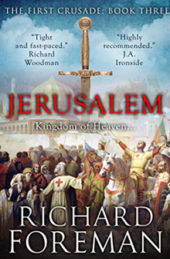Richard Foreman, Besieged is the second book in your fabulous The First Crusade series, could you tell us a little about it and what inspired you to write them?
After finishing of the Spies of Rome series I decided to return to the medieval period, having enjoyed writing The Band of Brothers books, about Henry V.
The First Crusade – and particularly the events surrounding the siege of Antioch – are sufficiently dramatic, without having to fictionalise them too much. You could say I was inspired by the attraction of being lazy. The story contains a clash of civilisations, suffering, heroism, reversals of fortune and a victory against all odds. History provided a great plot and cast of characters, so I didn’t have to.
The Battle of Antioch should be as iconic as Agincourt and Rorke’s Drift, in some ways. The First Crusade is a story of God and war, fear and faith. Although the story of Antioch can often be dark and depressing, as a writer it’s interesting – and even fun – to address the interplay between such subjects.
I wanted to shine a light on the epochal moment in history, which still has a legacy in Europe and the Middle East today, and introduce readers to figures such as Bohemond of Taranto and Bishop Adhemar. But as much as I may have given myself a slight educational brief when producing Besieged, far more importantly I have aimed to entertain.
Thankfully the first book, Siege, was a great success. The novel hit the highs of being in the top 100 of Amazon and was #1 in the Medieval History Chart. Part of the inspiration of writing the second book is that people enjoyed the first one in series.
What were the challenges you faced in researching this period of history and were there any unexpected surprises?
I am fortunate enough to know a number of medieval historians, who I chatted with first before commencing the project in earnest. They helped me to focus on certain themes and events. There are several excellent history books published, such as The First Crusade by Thomas Asbridge, Roger Crowley’s Constantinople: The Last Great Siege and Steven Runciman’s series on the crusades, which served as a source of information and inspiration too. The challenge, if it can be called one, was deciding what to leave out. I could have written a novel twice as long, but less is sometimes more. In terms of unexpected surprises, I was grateful that the sources provided so much insight and colour. For instance, such was the degree of starvation in Antioch that pilgrims would pick through manure for pieces of grain to eat. I am not sure I would have been able to make that up. Or have wanted to have made that up, without having to poke out my mind’s eye afterwards.
Can you tell us what a typical writing day look like for you?
I do not really have a typical day, for good or ill. I certainly get more writing done over the weekends, as the day job of running a publishing house takes up most of my time during the week. I tend to write first thing when the sun comes up during the summer months though. It’s also the smallest of small consolations, but lockdown has meant I have been able to write more and comfortably hit deadlines.
What do you think is the most challenging aspect of writing Historical Fiction?
It’s not a challenge, but it’s important to ensure you choose the right project to move forward with. If you do, you will be more engaged with the book and therefore more likely to finish any novel and engage readers too. When I initially started writing historical fiction, I think I was guilty of over researching books. History should rarely be at the expense of story – although the trick is to marry up both. The best historians will duly admit to being storytellers too. There are plenty of exceptions to the rule, but if you aspire to be a professional writer nowadays you need to write at least one novel a year – and meet the challenge of being prolific.
What advice do you have for aspiring Historical Fiction authors?
The most important thing an aspiring historical writer can do is read. The likes of Bernard Cornwell, George Macdonald Fraser and Hilary Mantel can teach a novelist far more about their craft than any creative writing tutor. As well as enjoying reading, read with a trade eye in relation to structure and style. Be aware of what the market wants. Most first books take a while to write. I would say to aspiring novelists however that it does get easier. You will learn to focus your research, find a voice and edit yourself – so eventually you should become a better and more prolific writer. There is light at the end of the tunnel, or at the very least a lighter shade of grey.
Wearing my publisher’s hat, I would stress to aspiring novelists to make sure you read submission requirements when approaching agents and publishers. It’s incredibly difficult to secure an agent and publisher in the current climate, but it’s also far from impossible. Be polite and professional in your dealings. Do not give up if you exhaust the options of finding an agent or publisher too. Lots of writers make money and produce good books via self-publishing. If you have written a manuscript that you are pleased with, then it shouldn’t just remain in the drawer.
Sharpe Books specialises in publishing historical fiction, by debut and established writers. I would recommend getting in touch if you have written in similar periods and genres to the titles on our list.
In short, keep on keeping on – like the crusaders.
Richard Foreman is the author of Besieged, the second in his The First Crusade trilogy.







